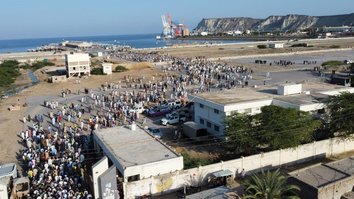ISLAMABAD -- The governments of Pakistan and China last week marked 10 years of economic collaboration through the China-Pakistan Economic Corridor (CPEC), a $54 billion joint infrastructure development programme.
But while both governments hail CPEC as a crowning jewel in Beijing's Belt and Road Initiative (BRI), residents of Gwadar, Balochistan's port city, say China's promises of prosperity and lucrative development for Pakistan turned out to be a pack of lies.
Chairing a meeting in Islamabad last month to review the progress of projects in Gwadar, Pakistani Minister for Planning, Development and Special Initiatives Ahsan Iqbal said "18 mega uplift projects were completed in Gwadar in record three months", according to the ministry.
Once completed, "all major projects under CPEC in Gwadar ... would become a shining pearl in the region", he said June 14.
![As part of the "Give Gwadar its Rights" campaign, thousands of Gwadar residents staged a protest on November 20, blocking the expressway leading to the Chinese-operated port. [Zarak Khan/Pakistan Forward]](/cnmi_pf/images/2023/07/11/42944-gwadar-protest-585_329.jpg)
As part of the "Give Gwadar its Rights" campaign, thousands of Gwadar residents staged a protest on November 20, blocking the expressway leading to the Chinese-operated port. [Zarak Khan/Pakistan Forward]
Over the years, CPEC investment has helped Islamabad improve transportation routes and boost the national electricity grid, according to Pakistani officials.
Of particular importance to Beijing, the project has built trade routes connecting China's far-western Xinjiang region to the strategically located Pakistani deep-water Gwadar port on the Arabian Sea.
However, despite a decade of collaboration, residents and activists say that basic civic issues in Gwadar, such as water, electricity, and quality healthcare and education, have not been resolved.
Locals 'miserable'
Instead, the city has been turned into a security zone, with residents' movements restricted to protect Chinese nationals working at the port from attacks by Baloch militant groups, who are angered by the growing Chinese influence in Balochistan.
"Instead of listening to the lies of Pakistani and Chinese government officials, people should visit Gwadar and see the reality for themselves," said Hameed Haut, a Gwadar-based political activist.
"CPEC did not benefit Gwadar's residents," he said. "Instead, the project made locals' lives miserable."
In December, Pakistani authorities -- at the behest of Beijing, according to locals -- cracked down on a protest movement in Gwadar that was conveying residents' concerns over Chinese influence on their livelihoods and daily lives.
At a protest in mid-November, residents blocked the expressway leading to the Chinese-operated port.
Under the banner of the "Give Gwadar its Rights" campaign, founded by local Jamaat-e-Islami Pakistan leader Maulana Hidayatur Rehman, protesters demanded an end to illegal deep-sea fishing by local and Chinese trawlers and the harassment of locals at security checkpoints leading to projects part of the CPEC.
"The Rehman-led movement only seeks an end to the harassment of locals at security checkpoints leading to Gwadar port, illegal deep-sea fishing by local and Chinese trawlers, and to address basic civic issues, such as water and electricity," Haut said.
After a spike in attacks on Chinese citizens and projects by Baloch militant groups, Pakistani authorities established dozens of security checkpoints to protect Chinese nationals working at the port.
In October, Aslam Bhootani, a Pakistani parliamentarian from Gwadar, informed the National Assembly about the exploitation of local residents by Chinese companies working on various projects in the city.
He accused the companies of denying jobs to locals and destroying the environment and marine life in the coastal areas, and called them "cheaters" for not paying taxes.
Beijing's plans for Gwadar
China's unwavering investment in Gwadar, despite security concerns and financial pitfalls, suggests that Beijing has other plans for the port, according to independent analysts.
"The prospects for China projecting military power over the Indian Ocean from Pakistan's western coast are growing," the United States Institute of Peace (USIP) said in March report.
"Pakistan is one of 13 countries named in the Pentagon's most recent report on China's military power as a potential location for additional Chinese military facilities and logistical units to be positioned in support of naval, air, ground, cyber and space power projection," it said.
The report noted "the conspicuous absence of commercial activity at Gwadar -- which has raised the suspicions of expert observers".
A March 2022 report from the Ankara Centre for Crisis and Policy Studies (ACCPS) also suggested that "China's major motivation for wanting to build a port in Gwadar is not commercial".
Rather, it is deemed necessary for "China's internal and foreign security policy".
Pakistan owes China about $30 billion, which accounts for nearly 30% of its foreign debt, according to estimates from 2022.
Islamabad's debt to Beijing continues to grow, but China has refused to defer or restructure the payment and CPEC debt repayments.

![A Pakistani naval personnel stands guard near a ship carrying containers at Gwadar Port on October 4, 2017. [Amelie Herenstein/AFP]](/cnmi_pf/images/2023/07/11/42950-tk5bd-highres-585_329.jpg)






